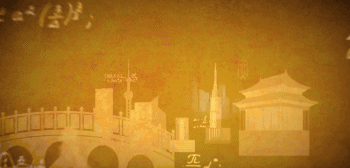
BBC紀錄片:《中國故事》
《中國故事》系列紀錄片共6集,由英國廣播公司和美國公共電視網(PBS)聯合制作播出,目標受眾是對中國缺少了解的普通西方觀眾。該系列紀錄片由英國知名歷史學家和電視主持人邁克爾·伍德擔綱撰稿和主持。本期推送的是該系列前三集。

英國曆史學家Michael Wood走訪名城古都,探索神秘國度幾千年文化的歷史淵源。
Michael Wood explores the history of the world's newest superpower, from its ancient past to the present day. Starting in Wuxi, Michael joins the Qin family reunion, when 300 relatives gather to worship their ancestors>To answer that question, Michael journeys to the plain of the Yellow River, where he joins a million pilgrims at the shrine of ancient goddess Nüwa, who legend says made the first people from the yellow mud of the Yellow River.
Looking for the origins of the Chinese state, he visits the excavations at Erlitou and sees an exquisite turquoise dragon sceptre from 2000 BC. China's first writing is found>Next, the Age of Philosophers and Confucius, whose book Analects has had greater influence worldwide than even the Bible, according to some. In Xi'an, we hear how the First Emperor united China and created the authoritarian Qin state that gave us the word China.
Finally, Michael returns to the temple fair in Henan for a dramatic night ceremony to give thanks to the ancestors. China, Michael concludes, is rising again, not just because of its economic strength, but because of the incredible solidarity of the Han Chinese view of their own civilisation, their sense of family and, of course, the presence of the ancestors.
公元7世紀,唐朝(618-907)是世界上最為強大的王朝。歷史學家Michael Wood走訪洛陽西安大運河,講述大唐往事。
Michael Wood tells the tale of China's first great international age under the Tang Dynasty (618-907). From the picturesque old city of Luoyang, he travels along the Silk Road to the bazaars of central Asia and into India on the track of the Chinese monk who brought Buddhism back to China. This tale is still loved by the Chinese today and is brought to life by storytellers, films and shadow puppet plays.
Then in the backstreets and markets of Xi'an, Michael meets descendants of the traders from central Asia and Persia who came into China on the Silk Road. He talks to Chinese Muslims in the Great Mosque and across town hears the amazing story of the first reception of Christianity in 635.
Moving south, Michael sees the beginnings of China as an economic giant. On the Grand Canal, a lock built in 605 still handles 800 barges every day! The film tracks the rise of the silk industry, and the world's favourite drink- tea.
Michael looks too at the spread of Chinese script, language and culture across east Asia. 'China's influence on the East was as profound as Rome on the Latin West', he says, 'and still is today'.
Finally, the film tells the intense drama of the fall of the Tang. Among the eyewitnesses were China's greatest poets. In a secondary school in a dusty village, where the Chinese Shakespeare – Du Fu – is buried in the grounds, the pupils take Michael through one famous poem about loss and longing as the dynasty falls. And in that ordinary classroom, there is a sense of the amazing drama and the deep-rooted continuities of Chinese culture.

觀看地址:https://www.bilibili.com/video/av28802221/
(溫馨提示:影片需要複製連結到瀏覽器檢視哦)
宋朝(960-1279)普遍被認為是最富創造性的朝代。歷史學家Michael Wood走訪開封和杭州,觀賞宮殿,探索民間,品嚐美食,體味大宋風韻。
This episode tells the tale of what's broadly considered China's most creative dynasty – the Song (960-1279). Michael Wood heads to the city of Kaifeng, the greatest city in the world before the 19th century.
Here in Twin Dragon Alley, locals tell him the legend of the baby boys who became emperors. He explores the ideas and inventions that made the Song one of greatest eras in world culture, helped by China's most famous work of art, the Kaifeng scroll, which shows the life of the city in around 1120. A chef makes Michael a recipe from a Song cookbook, while a guide to 'how to live happy, healthy lives for old people', published in 1085 and still in print, is discussed with local women doing their morning exercises. The Song was also a great era for scientific advance in China. Michael steers a huge working replica of an astronomical clock, made by China's Leonardo da Vinci. Then at a crunch Chinese Premier League match, Michael tells us the Chinese invented football!
The golden age of the northern Song ended in 1127, when invaders sacked Kaifeng, but they survived in the south. At their new capital, Hangzhou, Wood joins locals dancing by the West Lake, while in the countryside he meets Mr Xie with his records of 40 generations of ancestors.
The final defeat of the Song took place in a naval battle in the estuary of the Pearl River in 1279. When all was lost, rather than surrender to the Mongols, a loyal minister jumped into the sea with the young boy emperor in his arms. 'So ended the glory of the Song', Wood concludes, 'but a new age would arise… as in China, it always has!'.







